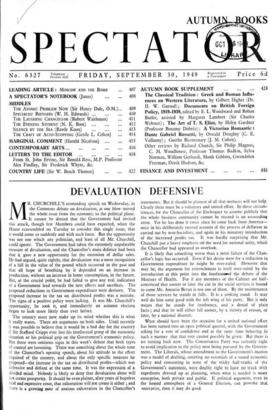DEVALUATION DEFENSIVE
R. CHURCHILL'S resounding speech on Wednesday, in
the Commons debate on devaluation, at one blow moved the whole issue from the economic to the political plane.
It cannot be denied that the Government had invited this attack, though few Members could have expected, when the House reassembled on Tuesday to consider this single issue, that it would come so suddenly and with such force. But the opportunity was not one which any politician, and least of all Mr. Churchill, could ignore. The Government had taken the extremely unpalatable measure of devaluation, and the Chancellor's main defence had been that it gave a new opportunity for the extension of dollar sales. He had argued, quite rightly, that devaluation was a mere recognition of a fall in the value of the pound which occurred in the past and that all hope of benefiting by it depended on an increase in production, without an increase in home consumption, in the future. But, at the crucial point, he had failed to give any real indication of a Government lead towards the new efforts and sacrifices. The proposed reductions in Government expenditure were derisory. The proposed increase in the tax on distributed profits was a mistake. The signs of a positive policy were lacking. It was Mr. Churchill's opportunity, he took it, and immediately an autumn election began to look more likely than ever before.
The country must now make up its mind whether this is what It really wants. There are arguments on both sides. Until recently it was possible to believe that it would be a bad day for the country if Sir Stafford Cripps ever lost his intellectual grasp of the economic situation or his political grip on the Government's economic policy. But there were ominous signs in this week's debate that both types of control are loosening. There was something about the whole tone of the Chancellor's opening speech, about his attitude to the effort required of the country, and about the only specific measure he proposed—the increase in the tax on distributed profits—which was defensive and defiant at the same time. It was the expression of a divided mind. Nobody is likely to deny that devaluation alone will not create prosperity. It should be even plainer, after years of hopeless trial aad expensive error, that exhortation will not create it either ; and there is a growing note of anxious exhortation in the Chancellor's statements. But it should be plainest of all that menaces will not help. Clearly there must be a voluntary and united effort. In these circum- stances, for the Chancellor of the Exchequer to assume publicly that the whole business community cannot be trusted is an astounding error. Yet he has done it twice since he came back from America— once in his deliberately twisted account of the process of deflation as carried out by non-Socialists, and again in his minatory introduction of the increased profits tax. It was hardly surprising that Mr. Churchill put a heavy emphasis on the need for national unity, which the Chancellor had appeared to overlook.
It is likely that something worse than a mere failure of the Chan- cellor's logic has occurred. Even if his desire were for a reduction in Government expenditure he might be over-ruled. However that may be, the argument for retrenchment is itself over-ruled by the introduction at this point into the forefronemof the debate of the Minister of Health. For if any members of the Cabinet are half- convinced that sooner or later the cut in the social services is bound to come Mr. Aneurin Bevan is not one of them. By the maintenance of those services he stands or falls. It is a striking stand. It may well do him some good with the left wing of his party. But it only means that he stands for insolvency, and a denial of plain facts ; and that he will either fall sooner, by a victory of reason, or later, by a national disaster.
What should have been the occasion for a united national effort has been turned into an open political quarrel, with the Government asking for a vote of confidence and at the same time behaving in such a manner that that vote cannot possibly be given. But there is no turning back now. The Conservative Party was certainly right to avoid implication in the policy now being pursued by the Govern- ment. The Liberals, whose amendment to the Government's motion was a model of drafting, omitting no essentials of a sound economic policy and consenting in none of the tricky half-truths of the Government's statement, wcrc doubly right to have no truck with expedients dressed up as planning, when what is needed is more enterprise, both private and public. If political argument, even in the heated atmosphere of a General Election, can provoke that enterprise, then it may do good.














































